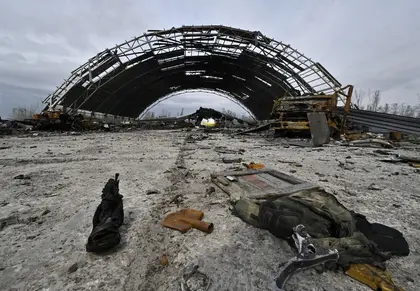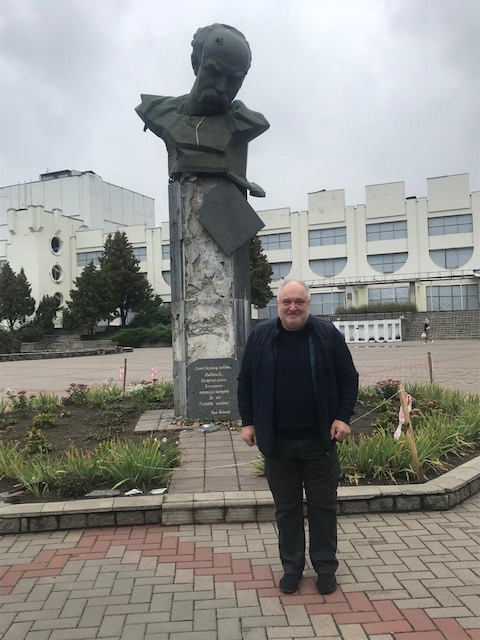When the war began Volodymyr Tsybulko found himself at the focal point of Russia’s invasion: Hostomel Airport, just north of Kyiv. For a month he struggled to maintain a sense of normality as horrors unfolded all around.
“The first thing the orcs said when they came to my door was, ‘Old man, give me your boots.’”
JOIN US ON TELEGRAM
Follow our coverage of the war on the @Kyivpost_official.
“I don’t think my size will fit you,” is all Volodymyr Tsybulko, a massive bear of a man, said.
Tsybulko, 58, has a gentle yet authoritative demeanor, and a deep voice that’s hard to forget. So, when Russian armored vehicles came to the gated community where he lives just north of Kyiv, Tsybulko hoped none of the Russian soldiers would recognize who he was.
Tsybulko – a poet, political advisor, and former member of parliament – makes regular appearances on Ukrainian TV. Since Russia’s invasion of Ukraine in 2014, Tsybulko has also been the token Ukrainian on many political talk shows aired on Russian TV, vehemently arguing the Ukrainian position and trying to chip away at Moscow’s propaganda machine.
He was concerned about being recognized and dragged out as a prized captive. But from the looks and speech of young Russian soldiers, they didn’t seem to be overly politically aware. All the same, he grew out his white beard to give him the look of a doddering old man.
On Feb. 24, the first day of Russia’s full-blown attack, Tsybulko made the short drive from his home in Blystavytsia, a small village that has become one of Kyiv’s bedroom communities, to Hostomel Airport, where it was clear the Russians were landing paratroopers from planes and helicopters.

EU Transfers €1.5 Bln Raised From Russian Assets for Ukraine
When he got too close to the shooting he had to turn back. On the way home he picked up some members of Ukraine’s territorial defense and gave them a lift. They filled him in on the situation. It was grim. The Russians were landing elite troops at the military airport in an attempt to blitz their way into Kyiv, whose city limits were just nine kilometers away.
Word was out that columns of tanks were on their way from the direction of Chornobyl.
The initial reaction was chaotic, but there was never any doubt that the Ukrainians would put up a fierce fight. A helicopter near the airport had already been hit by a territorial defense unit and forced to make an emergency landing. Soon nearby Ukrainian troops would be lobbing artillery at the invaders.
Within days, surviving Russian paratroopers at the airport had been chased into nearby woods.
By that time Tsybulko was ensconced in his comfortable home, not sure what to expect. When Russian soldiers showed up a few days later, he knew he had to figure out a survival strategy. He was alone in the house. His wife was in Lviv with their son, and his other son was in Berlin. Stray cats and dogs that came to be fed were his only company.
One of the first things he did was make the house appear to have already been looted. He covered his car in the garage with a tarp and piled worthless objects and trash on top. “Whenever the orcs looted, they pulled stuff away from the walls and into the center of the room. So, if they peeked through the windows, they’d assume it had already been looted and pass by my house.”
Over time some of the soldiers occupied other houses in the gated community. Bucha is literally down the road. Irpin somewhat farther.
In big white block letters Tsybulko wrote the word “PEOPLE” on the side of his house. The occupiers came to look for water. Tsybulko had already buried the sprinkler nozzle for his herb garden under a mound of earth so the soldiers would have no reason to go into his yard.
On one occasion a Russian soldier pointed his automatic rifle at Tsybulko and asked him to fill a jerry can with water.
“I’m an old man,” Tsybulko said. “You don’t need to point that gun at me.”
“Old man,” the Russian replied. “We had an old man go get some water for us a few days ago. He came back and threw a Molotov cocktail into our car.”
There was no electricity and Tsybulko would only burn a little wood at night to keep the house heated a little so the pipes wouldn’t freeze over. He slept in a cubby hole under the stairs to the second floor, so that if anyone were to come in at night they would assume the house was abandoned.
He intuitively began to understand survival mechanisms no one could have taught him. For example, wearing white, or other bright colors was better. Trigger-happy soldiers are more easily frightened by earth colors or black clothes that can be mistaken for a soldier or saboteur.
Early on, his neighbor’s roof was hit by a mortar and the blast blew out Tsybulko’s garage window. Another luxurious house across the nearby pond was destroyed. Not far from there, Tsybulko later learned from his neighbors that a couple of Russian soldiers shot each other in the knees so they wouldn’t have to continue fighting.
By the time Blystavytsia was liberated Tsybulko didn’t recognize himself. He felt he had aged inordinately.
And yet, despite the obvious horrors going on around him, he couldn’t help but appreciate the air of absurdity to his situation. The Russians, at least the average soldier, were genuinely surprised that they weren’t wanted there.
Tsybulko often had conversations with soldiers he deemed to be more reasonable. “These dialogues would make for an incredible play, with some improbably comical moments.”
In fact, the entire tragic war, he notes, seems to be based on absurdly comical premises. Foremost, that a population unwittingly enslaved to a web of lies should endeavor to “liberate” a free people striving to make their own imperfect society even freer.
When the soldiers saw how well people live in Kyiv’s suburbs, many were bitter with envy. Hence so much of the senseless killing – as if spite might have some redeeming quality.
Tsybulko hopes to write more about his experience under occupation, but for now he is still revising his first poetic impressions. Although he continues his work as a political analyst, certain experiences are simply unfathomable from the limited perspective of analysis.
“no one returns from war young
these strange two-year-old grandpas
won’t have the right words
to explain their earlier age …
war turns all words into screams …
these houses, this forest, this space
these letters PEOPLE still undevoured
will testify to the undestroyed life
white letters will live in place of people”
You can also highlight the text and press Ctrl + Enter







